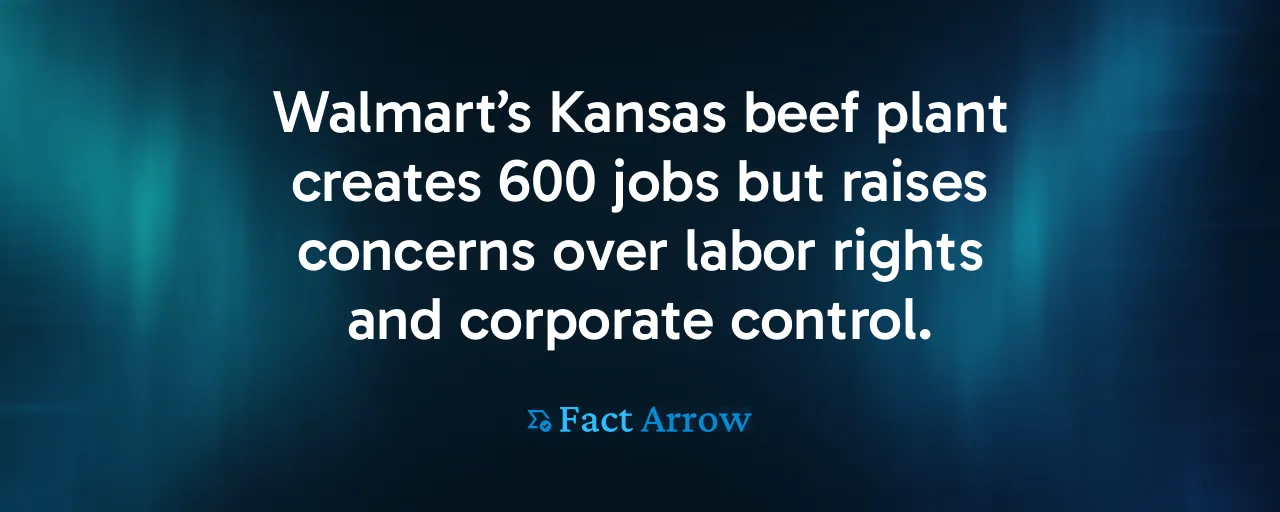A New Chapter for Kansas Beef
Walmart's latest venture in Olathe, Kansas, is turning heads. The retail giant's first fully owned beef processing plant, opened in June 2025, promises over 600 new jobs and a tighter grip on the Midwest's meat supply chain. Governor Laura Kelly hailed the $250 million facility as a win for rural communities, emphasizing its role in boosting the state's agricultural economy. The plant, sourcing Angus beef from nearby Sustainable Beef LLC, aims to streamline distribution to hundreds of stores. At first glance, it's a story of growth and opportunity.
Beneath the ribbon-cutting ceremonies, questions linger. The facility's arrival highlights a broader issue: how corporate giants shape the food system. While job creation is undeniable, the plant's impact on workers, small ranchers, and the environment demands scrutiny. Aligning economic progress with fair wages, market equity, and sustainable practices is essential for truly serving Kansas communities.
Jobs With a Catch
The numbers sound impressive. Over 600 direct jobs, with annual payrolls exceeding $30 million, signal a lifeline for Olathe's workforce. Many of these positions offer benefits, a rarity in some manufacturing sectors. Kansas State University researchers project an additional 1,100 indirect jobs in related industries like transportation and packaging. For a region with unemployment below 3 percent, these roles could stabilize households and spur local spending.
Not all jobs are created equal. Meatpacking is grueling work, often linked to ergonomic injuries and inconsistent scheduling. Past industry trends show wages stagnating against rising living costs, particularly in Johnson County. Without strong labor protections or union access, workers risk being shortchanged. The 2020 pandemic exposed meat plants as hotspots for unsafe conditions, with workers facing high risks. Advocates for fair employment argue that state incentives to Walmart would be more effective with conditions like wage floors and safety audits, ensuring the jobs genuinely benefit workers.
Squeezing the Small Rancher
Walmart's plant represents a significant consolidation of power within the industry. Four companies already control 85 percent of U.S. beef processing, and Walmart's move toward vertical integration tightens that grip. Small ranchers, already struggling with volatile cattle prices, face a tougher road. USDA data show beef prices climbed nearly 9 percent last year, though ranchers saw little of those profits. Large processors like Walmart can dictate terms, leaving family farms with slimmer margins.
Independent meatpackers feel the heat too. Smaller processors, vital to local economies, cannot match Walmart's scale or automation. Kansas once thrived on diverse, community-based meatpacking; post-1980s consolidation, however, shifted power to a few giants. Policies like the Packers and Stockyards Act could curb anti-competitive practices; however, enforcement lags. Supporting regional processors through grants or technical aid could preserve market diversity and protect rural livelihoods.
Environmental Costs on the Table
Beef production carries a heavy environmental load. The EPA attributes about 3 percent of U.S. greenhouse-gas emissions to beef cattle, with additional strain from water use and wastewater. Walmart's high-tech facility may reduce food waste by up to 10 percent through advanced packaging; however, its scale amplifies emissions and resource demands. Environmental groups call for transparent reporting on the plant's energy sourcing and waste management to ensure accountability.
Kansas has a chance to lead here. State-backed programs could incentivize climate-smart practices, like methane capture or regenerative grazing, for suppliers like Sustainable Beef LLC. Tying corporate incentives to measurable environmental goals would align economic growth with long-term sustainability. Without such measures, the plant risks adding to the ecological burden while rural communities bear the consequences.
A Path to Shared Prosperity
Walmart's plant offers real benefits, from jobs to supply-chain stability; however, its success hinges on fairness. Workers benefit from wages that match the cost of living and protections that prioritize their safety. Small ranchers benefit from policies that level the playing field against corporate giants. Careful stewardship of the environment is essential to ensure today's gains do not harm tomorrow's resources.
Kansas can chart a better course. Conditioning state support on wage standards, union access, and emissions transparency would set a precedent. Strengthening antitrust enforcement and investing in local processors could preserve market competition. Community voices, from labor unions to environmental advocates, are vital in shaping these decisions, ensuring the plant serves all Kansans and prioritizes broader community benefit.
The Olathe facility represents a significant test for Kansas. Will Kansas prioritize equitable growth that lifts workers, ranchers, and the environment alongside profits? The answer lies in bold, balanced policies that turn opportunity into lasting progress for communities across the state.
